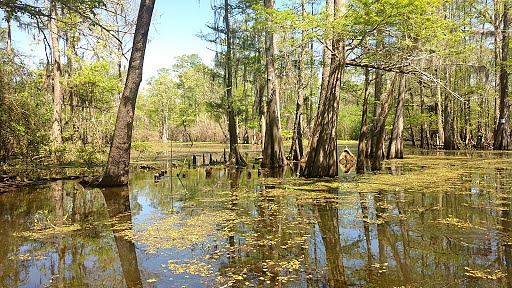
Co-written by Waterkeeper Alliance Staff Attorney Larissa Liebmann and Atchafalaya Basinkeeper Staff Attorney Misha Mitchell
In 2017, Sunoco Logistics Partners (Sunoco) merged with, and changed its name to, Energy Transfer Partners (ETP), the company behind the controversial Dakota Access Pipeline. Through this merger, ETP combined two companies with dubious incident and compliance histories. The Pipeline and Hazardous Materials Safety Administration reports that these companies had 321 pipeline incidents from January 1, 2006 to July 31, 2017, causing an estimated $66,083,987 in property damage. Of approximately 37,948 barrels of hazardous liquid released during these incidents, 26,658 barrels (70%) were never recovered.
The damage that pipeline companies cause can go far beyond the incidents recorded by the Pipeline and Hazardous Materials Safety Administration. The process of building pipelines can involve seizing land from private property owners through eminent domain and extensive, long-lasting impacts to the waterways that the pipelines cross. In 2017 alone, Energy Transfer Partners and Sunoco have released millions of gallons of drilling fluid into wetlands and contaminated water supplies in their rushed construction of new pipelines.
Just as alarming as the frequency of these spills, fires, explosions, and other incidents is the tepid response from government agencies in charge of regulating pipeline companies. Generally, government agencies fail to hold these companies truly accountable for the damage caused. For example, from January 2006 through October 2016, ETP caused $9.67 million in property damage but paid only $24,400 in penalties. From January 2006 through September 2013 Sunoco caused $42 million in property damage, yet paid only $1.2 million in penalties. While government agencies have occasionally compelled some corrective action by ETP and Sunoco after serious incidents, there is no evidence of significant proactive government efforts to prevent these incidents and reduce the severity of the impacts.
When pipeline companies are allowed to repeatedly cause damage without significant consequences, the communities along the pipeline route are the ones who bear the cost. Communities along pipeline routes must contend with private property being seized, forests, wetlands and waterways altered, and the continued risks of a sudden spill, explosion, or fire, which endangers human health and can devastate waterways. Some of the long-lasting impacts on communities from irresponsible pipeline construction can be clearly seen in the Atchafalaya Basin, where Energy Transfer Partners is now proposing to build the Bayou Bridge pipeline.
The Atchafalaya Basin, spanning some 1.4 million acres, is one of the most productive wetlands in the world, the largest river swamp in North America, and the most important ecosystem for migratory birds in the Western Hemisphere. Home to a wide array of aquatic biodiversity, migratory birds, and the largest contiguous bottomland hardwood forest in North America, the Basin also supports a Cajun culture with roots as deep and complex as the cypress trees that also call the area home. After migrating from France and being expelled from Canada, the Acadians (also called “Cajuns”) eventually settled in southern Louisiana. Cajuns reestablished their culture in the swamps of the Atchafalaya. Generations learned to work in the Basin’s swamps, rivers and bayous to provide for their families, a tradition that wanes as the Basin’s waterways are altered or encumbered.
One of the myriad threats facing the Basin today is unsustainable oil and gas pipeline construction and development. One of these pipelines, the Florida Gas pipeline, is owned in part by Energy Transfer Partners. Despite permit conditions to the contrary, this pipeline is one of many crossing the basin that remains out of compliance with its permit. The pipeline’s right-of-way contains a continuous large earthen dam of dredged spoil material (referred to as a “spoil bank”) traversing the length of the pipeline. Spoil banks inhibit the natural flow of water, create huge water quality problems, restrict navigation in the wetlands, exacerbate sedimentation, and block access and migration for species within the Basin.
In the face of global climate change, rising sea levels, coastal erosion, and an increasing threat of storms and flooding, the Atchafalaya Basin is essential to protect much of southern Louisiana from flooding. Despite this fact, the U.S. Army Corps of Engineers, the main federal agency with regulatory powers over wetlands, lacks the oversight and enforcement capacity needed to ensure that pipeline companies comply with permit conditions. The result is a labyrinth of destructive spoil banks throughout the Basin.
Energy Transfer Partner’s Florida Gas pipeline is no exception. Leftover spoil banks severely disrupt commercial crawfishing in the Basin, impairing the source of livelihood that the local Cajun communities rely upon for their sustenance and culture. The persistence of an incredibly rich Cajun culture is dependent upon the Basin’s abundance of aquatic species, water quality, natural flows and accessibility. Pipeline spoil banks increasingly limit the ability of these communities to endure.
Now, ETP is proposing to build another pipeline across the Basin — the Bayou Bridge Pipeline. This would mean one more pipeline at risk of spilling into the Basin, being built by a company that has already shirked its responsibilities to mitigate severe adverse impacts from earlier projects. Additionally, it would be permitted by the same agency that has allowed ETP and other companies to flout the law and its permits and damage the Basin for decades. Rather than rubber-stamping another dangerous pipeline, the U.S. Army Corps of Engineers must do its job and require extensive restoration to remove spoil banks along existing pipelines and hold pipeline companies accountable for the damage they cause. Otherwise, it will be the same old story: while pipeline companies continue to do business as usual, the waterways and communities that rely on them pay the price.